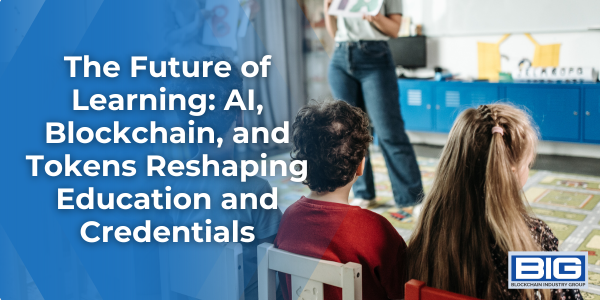
The landscape of education and credentials is undergoing a remarkable transformation driven by the convergence of artificial intelligence (AI), blockchain technology, and tokens.
This article explores how these innovations are reshaping the future of learning, revolutionizing traditional education models, and introducing new ways to validate and recognize skills and knowledge acquisition.
AI-Powered Personalized Learning
Artificial intelligence is revolutionizing education by enabling personalized learning experiences. AI algorithms can analyze vast amounts of data to understand individual learning styles, preferences, and strengths. This information allows AI-powered platforms to deliver tailored educational content, adaptive assessments, and personalized feedback, catering to the unique needs of each learner.
Example: Adaptive Learning Platforms
Adaptive learning platforms leverage AI to create individualized learning paths for students. These platforms continuously assess a student’s performance, analyze their strengths and weaknesses, and adapt the curriculum accordingly. By providing targeted content and interventions, AI-powered adaptive learning platforms maximize student engagement, improve learning outcomes, and empower students to achieve their full potential.
Blockchain for Secure Credentialing and Verification
Blockchain technology offers a secure and transparent platform for credentialing and verification in the education sector. By leveraging blockchain, educational institutions can issue and store tamper-proof digital credentials, such as diplomas and certificates, in a decentralized and immutable manner. This enhances the security, authenticity, and portability of educational credentials.
Example: Blockchain-Based Digital Diplomas
Institutions can issue digital diplomas on the blockchain, ensuring that they are tamper-proof and verifiable by employers and other stakeholders. The decentralized nature of blockchain eliminates the risk of fraudulent credentialing and provides a transparent and reliable method for employers to verify an individual’s qualifications. This enhances trust and reduces the administrative burden associated with manual verification processes.
Tokens and Digital Badges: Recognizing Skills and Achievements
Tokens and digital badges, often based on blockchain technology, are transforming the way skills and achievements are recognized and valued. These digital representations of skills and knowledge acquired can be earned, tracked, and shared across platforms and institutions. Tokens and badges provide a decentralized and verifiable method to showcase a learner’s competencies and achievements.
Example: Open Badges for Skills Validation
Open Badges, based on the Open Badges specification, are a popular form of digital badges that enable learners to showcase specific skills and achievements. These badges are issued by educational institutions, organizations, or online platforms and can be collected and displayed in a learner’s digital badge backpack. Open Badges can represent a diverse range of skills, from programming languages to project management, enabling learners to showcase their capabilities and stand out in the job market.
The Rise of Decentralized Learning Platforms
The combination of AI, blockchain, and tokenization is paving the way for decentralized learning platforms. These platforms facilitate peer-to-peer learning, collaborative knowledge creation, and the exchange of tokens for educational content and services. Decentralized learning platforms promote lifelong learning, foster global communities of learners, and democratize access to high-quality education.
Example: Token-Driven Learning Communities
Alan Turing, the Turing Test and the Singularity
—
AlphaGo and AlphaZero: Masters of GO
—
Artificial Intelligence: Are Human Jobs at Risk?
Token-driven learning communities enable learners to earn, exchange, and use tokens within the community ecosystem. Tokens can be earned through contributions, achievements, and peer reviews. These tokens can then be used to access premium content, enroll in advanced courses, or even gain voting rights within the community governance structure. Such platforms incentivize active participation, collaboration, and continuous learning.
The future of learning is being shaped by the transformative power of AI, blockchain, and tokens. Personalized AI-driven learning experiences, blockchain-based credentialing, and tokenization are revolutionizing traditional education models and offering new pathways for recognition and validation. As these technologies continue to advance and become more widely adopted, we can expect to see a fundamental shift in how education is delivered, recognized, and valued. Learners will have access to tailored learning experiences, secure and portable credentials, and decentralized platforms that foster collaboration and lifelong learning. The future of learning is indeed a dynamic and exciting space where AI, blockchain, and tokens are reshaping the landscape and empowering individuals to thrive in an ever-evolving knowledge economy.



